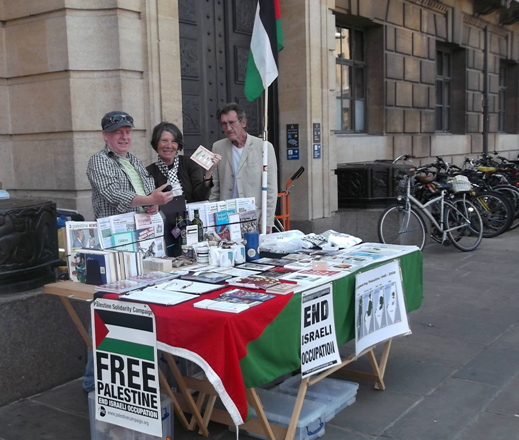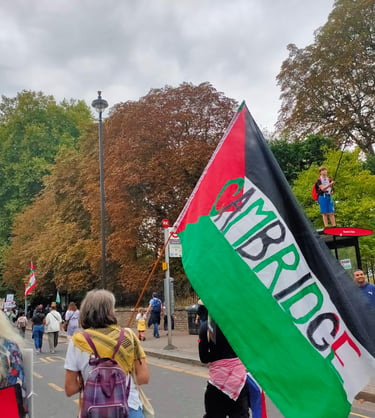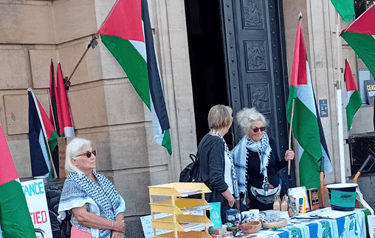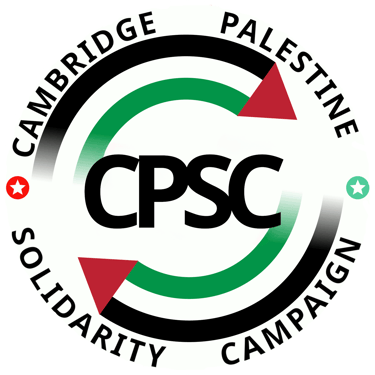Our History
1990-2000: Cambridge Palestine Solidarity Group's Early Years
• In 1990, a Cambridge Palestine Solidarity Saturday stall was established in Market Square.
• Initial planning meetings involved Slim Piggott, Clare Hariri, Bill Hayton, Mike Reid, and Mui'Hadid as University Co-ordinator.
• The group worked closely with university students, academics, and Cambridge citizens.
• Cambridge became an official PSC branch in August 1991.
• In January 1991, the group became involved with the 6-week Cambridge Anti Gulf War Campaign.
• In 2000, Slim Piggott and his wife, Jane Tienne, reconstituted the stall after the Second Intifada.
• The campaign was reconstituted with the help of London PSC and city council permission.
• The campaign faced tumultuous early days, with Zionist sympathizers accusing the group of supporting terrorism and defending Israel's right to exist.
• Local members, including Mika, Jonathan, and Averil’s son, Martin Searle, went to Palestine as ISM volunteers.
• Public meetings were organized for these courageous young people to share their experiences.


2001-2016: Cambridge PSC's Public Events and Events
• Janet Walker joined the PSC in 2001 and organized public events with speakers from London, both Brits and Palestinians.
• In 2003, the PSC organized a "Festival of Films from Palestine" featuring Palestinian film producer Michel Kheleifi.
• The PSC aims to educate people about Palestine to counter the one-sided narrative presented by media and politicians.
• The PSC has hosted numerous events and speakers, including a 2-week exhibition of large photographs of human scenes at checkpoints in the West Bank in 2011.
• In 2013, the PSC hosted Norwegian physician Mads Gilbert, who had worked at Al Shifa hospital in Gaza during the first major bombardment by Israel, operation Cast Lead.
• Authors' book talks were featured, including Greg Philo from the Glasgow University Media group and Palestinian-American author Susan Abulhawa.
• In 2017, Thomas Suarez promoted his book 'State of Terror', which faced national attack and was forced to change the venue due to accusations of antisemitism.




2017- Present: Centenary of Balfour Declaration and Student Actions
• Robert Cohen, author and blogger, spoke on ‘The Lost Jewish Voices of Dissent Against Balfour’.
• High-profile action was taken against Professor Stephen Hawking's boycott of the Presidential Conference in Israel in 2013.
• Collaborative efforts with the British Committee for Universities in Palestine (BRICUP) and former Cambridge University students were used to corroborate Hawking's decision.
• Collaboration with the student body was based on mutual support, attendance, publicity, and sometimes financial input.
• Students organized events for Israeli Apartheid Week and supported physical actions like mock checkpoints at the Sidgwick site.
• In May 2024, Cambridge City council became the first in the country to call for an end to arms sales to Israel.
• Collaborative efforts with Uni PalSoc, Cambridge STW, local trade unions, and other local activists.
• Some members have been involved with the Boycott Israel Network (BIN), which promotes UK support for the Palestinian 2005 call for Boycott, Divestment, and Sanctions against Israel.
• The student encampment this year called on the university to divest from companies involved in supplying arms to the Gaza conflict, part of the broader BDS movement.
CPSC Solidarity
Working for peace, equality, and justice together.
Reach out
Sign up to receive regular updates
All enquiries:
© 2024. All rights reserved. Privacy Statment
quick links
